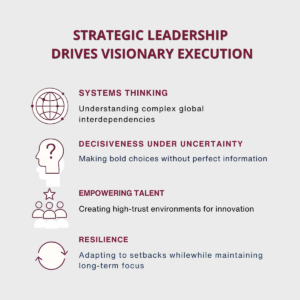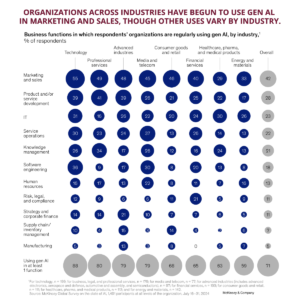
How Executives Stay Ahead Through Strategy
Anticipate, Adapt, Advance!
Economic volatility, geopolitical tensions, and rapid technological disruption are reshaping today’s executive landscape. Navigating this complex terrain requires more than operational excellence. It demands proactive strategy. Exceptional executives are proactively mapping out what’s next for both their organizations and their careers. That’s where strategic foresight becomes your most valuable asset. With the right guidance, it’s not just theory; it’s a competitive advantage.
Strategic Leadership in 2025: What It Really Means
If you’re aiming for the boardroom, a global C-suite role, planning a pivot, or just making sure you stay one step ahead, strategic leadership means thinking beyond the quarterly cycle. It’s about aligning vision with smart execution, guiding organizations through ambiguity, reading the signs, and knowing when to act.

Capabilities That Set Strategic Leaders Apart
1. Horizon Scanning and Future-Casting
Forward-thinking, strategic leaders don’t just envision the future; they actively scan the horizon for emerging market trends, threats, technological disruptions, and shifting societal values. Tools like PESTLE analysis and the OECD’s strategic foresight toolkit help leaders understand shifts in markets, tech, and society before they hit.
Here are some activities executives can put into action:
-
- Task a cross-functional team with tracking trends.
- Watch adjacent industries for early signals.
- Test assumptions and refine regularly.
Strategic leaders who excel in horizon scanning and future-casting are the ones other leaders may look to for direction, innovation, and forward momentum.
2. Staying Agile Amid Economic Uncertainty
Rigid annual plans have now become somewhat of a relic, replaced by dynamic planning. According to McKinsey & Company, “Agile organizations have outperformed their peers in terms of both operational performance and organizational health.”
Leaders can accomplish this by:
-
-
Shifting to rolling forecasts and quarterly sprints vs. years.
-
Running pilot programs and scale what works.
-
Empowering teams to make real-time calls.
-
Using strategic checkpoints to pivot quickly based on market or tech disruptions.
-
“Companies that are prepared are more ready to act when the situation warrants, so companies should develop cross-functional, what-if contingency plans across the full scope of people, processes, and technology,” advises Forrester.
3. Building an Anticipatory Culture
Foresight isn’t a top-down mandate; it’s a cultivated, shared organizational mindset. Strategic leaders foster teams that challenge the status quo, flag risks early, and aren’t afraid to think ahead. This helps to create a collective intelligence that anticipates change.
To develop this culture, leaders can:
-
- Encourage curiosity across departments.
- Reward those who think a few steps ahead.
- Promote collaboration and open feedback.
- Lead by example and train for foresight.
Beyond these capabilities, truly strategic leaders are laser-focused on specific areas that are shaping the modern business landscape.
Some Key Shifts That Can’t Be Ignored
The economic outlook is shifting dramatically. The OECD forecasts only modest global growth of 3.1% in 2025, driven by slowing consumer demand, interest rate uncertainty, and ongoing geopolitical conflict according to an OECD Outlook.
Simultaneously, artificial intelligence (AI) and data analytics are reshaping leadership roles.
1. Leveraging AI And Data Analytics For Predictive Insights
AI is moving fast—and so should your strategy. McKinsey reports that “since early 2024: 71 percent of respondents say their organizations regularly use gen AI in at least one business function, up from 65 percent in early 2024.”
From market modeling to competitive analysis, executives are using AI to do these functions and more:
-
- Spot mergers and acquisition targets.
- Forecast disruption.
- Conduct complex simulations on market and competitive landscape evolution.
- Cut through data clutter, accelerate research, and mitigate human biases in strategy development with real insight.

Image by McKinsey & Company
2. Supply Chain as Strategy
Recent global events have starkly highlighted supply chain vulnerabilities, making resilience a clear strategic competitive advantage; it’s leverage. For strategic leaders, this means:
-
- Shifting the perception of the supply chain from merely a cost center to a critical strategic function.
- Diversifying sourcing.
- Using analytics for real-time decisions.
- Collaborating deeper with vendors.
3. Geopolitics & Market Access
Geopolitical tensions directly impact business strategy, supply chains, and market access. The World Economic Forum emphasizes that “A strong geopolitical radar… can help businesses avoid risk and gain a competitive edge.”
Strategic leaders are now actively cultivating their “geopolitical radar” by:
-
- Understanding local dynamics and regulations.
- Moving beyond reactive responses to sanctions or tariffs, and investing in comprehending the fundamental drivers of geopolitical change, such as the US-China competitive landscape or the regionalization of trade.
- Preparing for trade shifts and regionalization.
- Building internal capabilities to track global change.
4. ESG As A Strategic Driver
Environmental, Social, and Governance (ESG) factors are no longer mere regulatory checkboxes; they are profoundly influencing investor decisions, attracting talent, and creating long-term value.
Applying Strategic Foresight to Your Own Career
You’re relentlessly focused on driving organizational performance, but what about the strategic leadership of your own future? It’s equally imperative. With over 50% of professionals actively considering career changes, according to Forbes, the landscape demands a proactive approach. If you’re still relying solely on job boards or waiting for recruiters to call, it’s time to rethink your strategy.
Why Trusted Advisors Matter
Leading significant transformations demands deep insight, and your executive career warrants no less. Top-tier leaders consistently engage with specialized advisors to:
-
- Anticipate blind spots before they become obstacles.
- Strategically position themselves for upcoming opportunities.
- Maintain accountability and focus amidst complex decisions.
The Times reports that executive coaching has an 89% effectiveness rate for advancement. And that’s just one piece of the puzzle.
The Cost of Inaction and Why Proactivity Pays Off
While diligently driving company performance, many top executives remain in reactive career patterns. This is a strategic liability. Consider this: 85% of jobs are filled through networking, according to Forbes. And critically, aAt The Barrett Group – the leading international career management company, we teach our clients the art of building social capital. In fact, 75% of our clients land through the unpublished market because we essentially improve their chances of being in the “right” place and the “right” time. Relying on traditional job boards or recruiter calls simply won’t get you to the next echelon of executive leadership.
Why Strategic Leaders Partner with The Barrett Group
Strategic leadership isn’t just about driving results—it’s also about knowing when to seek expert guidance to navigate pivotal career transitions. That’s where The Barrett Group’s proven approach comes in.
Our proprietary 5-step methodology has been refined over three decades to deliver unparalleled results:
-
- Clarity Program©: Defining your unique value and career objectives.
- Personal Branding & Campaign Development: Crafting a compelling executive identity.
- Market Access: Unlocking the hidden, unpublished market.
- Interview & Offer Preparation: Mastering high-stakes conversations and securing optimal terms.
- Onboarding: Ensuring a seamless and impactful transition.
Accessing the Unpublished Market for Real Results
Our strength lies in guiding clients directly into the unpublished market. Up to 75% of executive roles are never posted. At The Barrett Group, we help you open doors through the right relationships, raise your profile with key decision-makers, and tell your story in a way that gets results.
This means that through confidential guidance and coaching, you gain:
-
- Exclusive access to hidden opportunities: Discovering roles your competition never sees.
- Strategic outreach directly to decision-makers: Cutting through the noise to connect with key influencers.
- High-Performance Positioning: Presenting yourself as the precise solution to an organization’s strategic problems.
The competitive edge offered by The Barrett Group is that we work for you, the executive, not a company looking for a candidate. This keeps our loyalty to you and gives you a competitive edge.
“I became convinced of the power of the unpublished market. I applied to so many published jobs and got nothing. Even when I worked with 3rd party recruiters, the results were nothing compared to when I began tapping into my network.” Joel Engle, Chief Growth Officer, [Read more] Similarly, Keith Brown, a Director of Development, transformed his career by leveraging the unpublished market and building social capital with our support. [Read more]
Our competitive edge is clear: we work exclusively for you, the executive, not a company looking for a candidate. This unwavering loyalty ensures unbiased guidance and maximizes your advantage.
The Bottom Line is Anticipate; Don’t Hesitate
Executives who thrive in this era are not waiting. They are planning and investing in their own trajectories both personally and in their corporate strategies.
If you’re ready to transition into a more meaningful leadership role, pivot industries with purpose, or future-proof your career, it’s time to stop winging it and start winning with strategy. A strategic partner can help you navigate what’s next with confidence.
Take the first step today and get started with a free consultation, or call 800-304-4473 to connect with a career coach.
Written by Keiva Ditchfield-Agboh – The Barrett Group.












